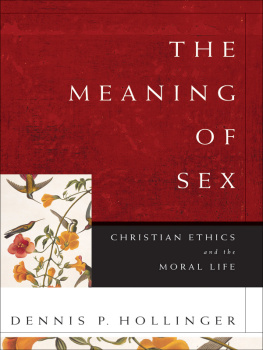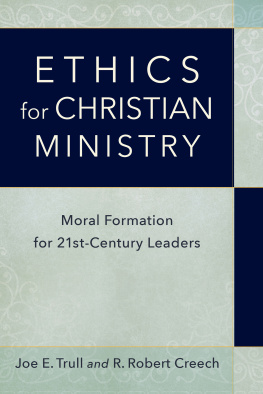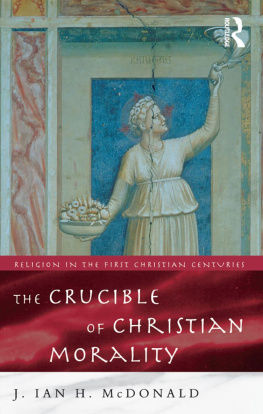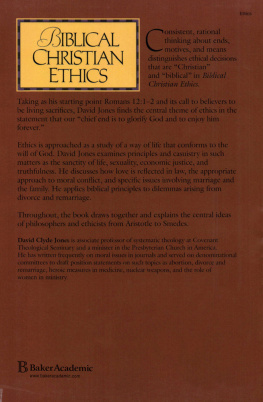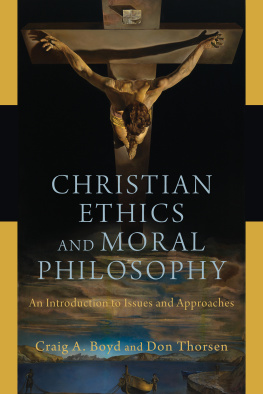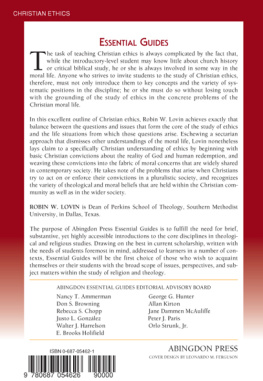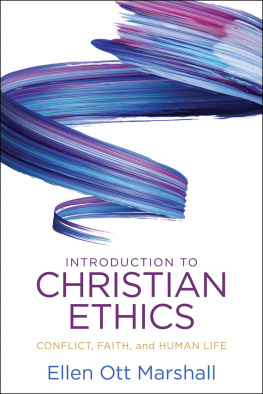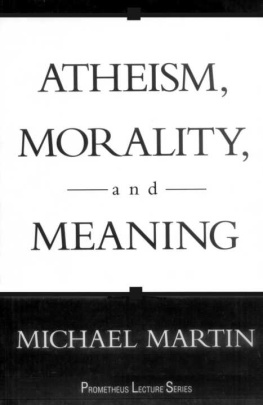The Christian Moral Life
Practices of Piety
Timothy F. Sedgwick

Copyright 1999, 2008 by Timothy F. Sedgwick
All rights reserved. No part of this book may be reproduced, stored in a retrieval system, or transmitted in any form or by any means, electronic or mechanical, including photocopying, recording, or otherwise, without the written permission of the publisher.
Library of Congress Cataloging-in-Publication Data
A catalog record of this book is available from the Library of Congress.
First published in 1999 by Wm. B. Eerdmans Publishing Co., 255 Jefferson Ave. SE, Grand Rapids, MI 49503.
Published in 2008 by
Seabury Books
445 Fifth Avenue
New York, New York 10016
www.seaburybooks.com
An imprint of Church Publishing Incorporated
5 4 3 2 1
For Martha, Sarah, and Ellen
Do not neglect to show hospitality to strangers, for by doing that some have entertained angels without knowing it.
HEBREWS 13:2
Contents

Preface to the 2008 Edition

The Christian moral life seeks to offer an account of the Christian life. It is in this sense that the word piety is used. Practices of piety refer not narrowly to spiritual practices butas the word piety originally meantto our duties that bind us to God, to our neighbors, and to our true selves. Christian ethics as reflection on the Christian life are not then narrow and separate disciplines concerned with right action (whether in terms of ends, virtues, or principles), but are grounded in our encounter with God and the practices that witness, nurture, and shape our continuing relationship with God. In this sense, The Christian Moral Life is formed in conversation with theology and with what has been traditionally called ascetical theology and what is now referred to more frequently as Christian spirituality or Christian practiceshence the subtitle, Practices of Piety.
In the Roman Catholic tradition moral theologies came to be more narrowly focused on offering direction to confessors in order that they might help penitents in the confession of sins and offer appropriate judgment and counsel. However, moral theologies from Thomas Aquinas to Barnard Haring have sought more comprehensively to ground moral principles and specific moral judgments in understandings of the end of human life in God, the nature of the human person, and human virtues grounded in relationship to God, all placed in the context of the sacramental, worshipping community of faith.
In this sense The Christian Moral Life seeks to offer a moral theology, grounded, however, in a renewed sense of the worshipping community. The understanding of the worshipping community in relationship to the world can no longer be taken-for-granted, as it was in the writing of traditional moral theologies when Christianity was established, what we call Christendom. Instead, the community of worship offers an alternative world, a sign of who we are meant to be, revealed in Scripture and known in the life of the community of faith as marked by its worship. So Edward Schillebeeckxs sacramental principle: as Christ is the sacrament of God to the world, the church is the sacrament of Christ.
The traditional elements of moral theology are then addressed in The Christian Moral Life within this larger context. There is an account of cardinal and theological virtues. These are grounded in an account of the encounter with God as a matter of hospitality to the stranger. Moral principles are developed as expressing the ends of action. And traditional questions are addressed, for example, the relationship between the love of God and neighbor, the first and the second table of the Ten Commandments, law and gospel, and love and justice. And this leads to the practices of piety, the nature of vocation, and the mission of God.
As I look back to my initial explorations of these matters in Sacramental Ethics: Paschal Identity and the Christian Life (Fortress, 1987) and ahead to Preaching What We Practice: Proclamation and Moral Discernment (Morehouse, 2007), with David Schlafer, I see how much my own work has explored what has been central to the great Anglican moral theologian Kenneth Kirk, from Some Principles of Moral Theology (Longmans, Green, 1920) and Conscience and Its Problems: An Introduction to Casuistry (Longmans, Green, 1927) to The Vision of God (Longmans, Green, 1928). The difference has been in casting the character of a Christian ethic in a post-Christendom world grounded in liturgical and sacramental theology. Here again, in Anglicanism this grounding in the worshipping community is prefaced by the first book to introduce the liturgical renewal movement in the English world, A.G. Heberts Liturgy and Society (Faber and Faber, 1935). The Christian Moral Life has this twentieth-century lineage. I hope that it may prompt its continued engagement and development.
__________
Edward Schillebeeckx, Christ: The Sacrament of the Encounter with God, tr. Paul Barrett (New York: Sheed and Ward, 1963).
Introduction

I have been fortunate to share in the worship of a variety of Christian churches. The power of those experiences has confirmed that the presence of God given in worship is inseparable from the call into the covenant of hospitality that is our daily life. I recall worship with a variety of Christian communities: with an Anabaptist community of Brethren during Holy Week where I shared with them foot washing and an agape meal; with an African-American congregation in the preaching and singing which drew out the congregation together in praise and in petitions for the world; with a Roman Catholic community of Benedictine monks in singing the daily offices as they have since the fourth century; with Quakers in the quiet stillness in their meeting; with Presbyterians in Sunday worship with prayers offered in response to scripture and the sermon; with Eastern Orthodox in their divine liturgy with incense rising, intoned prayers, and blessings; with an ecumenical group in reading scripture and offering prayer together; and with my seminary community in daily worship.
When I think about what is central to all such worship, I remember a Sunday Eucharist in China following the opening of China after the cultural revolution. The service was ecumenical in a reopened church without windows. I could not understand the Chinese, but the shape of the Eucharist drew me into the participation we call worship. That evening at dinner I sat next to an 83-year-old minister, a Chinese man who was formerly a Seventh Day Adventist. We talked about the changes sweeping China and we talked about the church. I asked him how his own faith and understanding of the church had changed since the Chinese Revolution in 1949. He said simply, We were wrong before. We thought more of our churches than of faith. Our effort was to preserve the church. Now we share one church because we know that we are the church only if we serve all people.
Nothing could express more clearly to me the nature of Christian faith. My Anglican roots have enabled me to see this vision of faith. But it is only in my own encounter and the consequent welcome and embrace of strangers of their embrace of me and of my embrace of them that I have known this life. From this comes an ecumenical spirit. The church is not the end of faith. Instead, the end of the church is Gods calling, to enable the voice of God that it may be heard calling all people into a covenant of hospitality.


